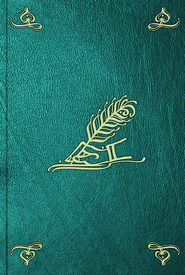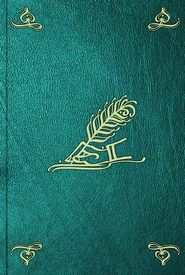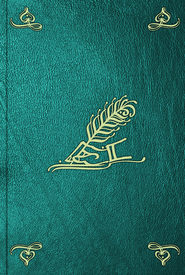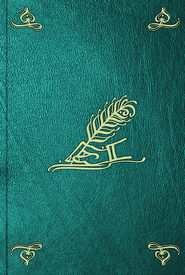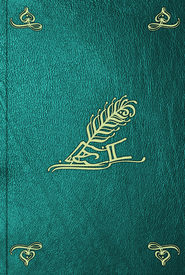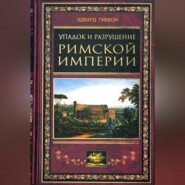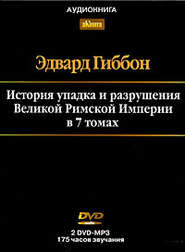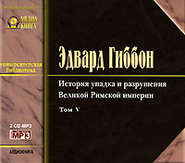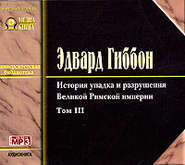По всем вопросам обращайтесь на: info@litportal.ru
(©) 2003-2025.
✖
Private Letters of Edward Gibbon (1753-1794) Volume 1 (of 2)
Настройки чтения
Размер шрифта
Высота строк
Поля
Dear Sir,
*An address in writing, from a person who has the pleasure of being with you every day, may appear singular. However, I have preferred this method, as upon paper I can speak without a blush, and be heard without interruption. If my letter displeases you, impute it, Dear Sir, only to yourself. You have treated me not like a son, but like a friend. Can you be surprized that I should communicate to a friend all my thoughts, and all my desires? Unless the friend approve them, let the father never know them; or, at least, let him know at the same time, that however reasonable, however eligible, my scheme may appear to me, I would rather forget it for ever, than cause him the slightest uneasiness.
UNFITNESS FOR POLITICAL LIFE.
When I first returned to England, attentive to my future interest, you were so good as to give me hopes of a seat in Parliament. This seat, according to the Custom of our venal country, was to be bought, and fifteen hundred pounds were mentioned as the price of the purchase. This design flattered my vanity, as it might enable me to shine in so august an assembly. It flattered a nobler passion; I promised myself that by the means of this seat I might be one day the instrument of some good to my country. But I soon perceived how little a mere virtuous inclination, unasisted by talents, could contribute towards that great end; and a very short examination discovered to me, that those talents were not fallen to my lot. Do not, Dear Sir, impute this declaration to a false modesty, the meanest species of pride. Whatever else I may be ignorant of, I think I know myself, and shall always endeavour to mention my good qualities without vanity, and my defects without repugnance. I shall say nothing of the most intimate acquaintance with his country and language, so absolutely necessary to every Senator. Since they may be acquired, to alledge my deficiency in them, would seem only the plea of laziness. But I shall say with great truth, that I never possessed that gift of speach, the first requisite of an Orator, which use and labour may improve, but which nature can alone bestow. That my temper, quiet, retired, somewhat reserved, could neither acquire popularity, bear up against opposition, nor mix with ease in the crowds of public life. That even my genius (if you will allow me any) is better qualified for the deliberate compositions of the Closet, than for the extemporary discourses of the Parliament. An unexpected objection would disconcert me; and as I am incapable of explaining to others what I do not thoroughly understand myself, I should be meditating, while I ought to be answering. I even want necessary prejudices of party, and of nation. In popular assemblies, it is often necessary to inspire them; and never Orator inspired well a passion, which he did not feel himself. Suppose me even mistaken in my own Character; to set out with the repugnance such an opinion must produce, offers but an indifferent prospect. But I hear you say It is not necessary that every man should enter into Parliament with such exalted hopes. It is to acquire a title the most glorious of any in a free country, and to employ the weight and consideration It gives in the service of one's friends. Such motifs, tho' not glorious, yet are not dishonourable; and if we had a borough in our command, if you could bring me in without any great expence, or if our fortune enabled us to dispise that expence, then indeed I should think them of the greatest strength. But with our private fortune is it worth while to purchase at so high a rate, a title, honourable in itself, but which I must share with every fellow that can lay out Fifteen hundred pounds? Besides, Dear Sir, a merchandize is of little value to the owner, when he is resolved not to sell it.
I should affront your penetration, did I not suppose you now see the drift of this letter. It is to appropriate to another use the sum you destined to bring me into Parliament; to employ it, not in making me great, but in rendering me happy. I have often heard you say yourself, that the allowance you had been so indulgent as to grant me, tho' very liberal in regard to your estate, was yet but small, when compared with the almost necessary extravagances of the age. I have indeed found it so, notwithstanding a good deal of œconomy, and an exemption from many of the common expences of youth. This, Dear Sir, would be a way of supplying these deficiencies, without any additional expence to you. – But I forbear. – If you think my proposals reasonable, you want no entreaties to engage you to comply with them; if otherwise, all will be without effect.
All that I am afraid of, Dear Sir, is, that I should seem not so much asking a favour, as this really is, as exacting a debt. After all I can say, you will still remain the best judge of my good, and your own circumstances. Perhaps, like most Landed Gentlemen, an addition to my annuity would suit you better than a sum of money given at once. Perhaps the sum itself may be too considerable. Whatever you shall think proper to bestow upon me, or in whatever manner, will be received with equal gratitude.
I intended to stop here; but as I abhor the least appearance of art, I think it will be better to lay open my whole scheme at once. The unhappy War which now desolates Europe, will oblige me to defer seeing France till a peace. But that reason can have no influence upon Italy, a country which every Scholar must long to see; should you grant my request, and not disaprove of my manner of employing your bounty, I would leave England this autumn, and pass the winter at Lausanne, with M. de Voltaire and my old friends. The armies no longer obstruct my passage, and it must be indifferent to you, whether I am at Lausanne or at London during the winter, since I shall not be at Beriton. In the spring I would cross the Alps, and after some stay in Italy, as the war must then be terminated, return home thro' France, to live happily with you and my dear Mother. I am now two or three and twenty; a tour must take up a considerable time, and tho' I believe you have no thoughts of settling me soon, (and I am sure I have not) yet so many things may intervene, that the man who does not travel early, runs a great risk of not travelling at all. But this part of my scheme, as well as the whole, I submit entirely to you.
Permit me, Dear Sir, to add, that I do not know whether the compleat compliance with my wishes could encrease my love and gratitude; but that I am very sure, no refusal could minish those sentiments with which I shall always remain, Dear Sir, your most dutiful and obedient son and servant,*
E. Gibbon, Junior.
18.
To his Stepmother
Winchester Camp,[Footnote_25_25 - In June, 1759, Gibbon and his father joined the Hampshire regiment of militia as respectively captain and major. The South battalion, to which they belonged, was kept "under arms, in constant pay and duty," from the date of its enrolment till December 23, 1762, when it was disbanded as a permanent force. The battalion was at Winchester Camp from June 25 to October 23, 1761, and from the latter date to February 28, 1762, at "the populous and disorderly town of Devizes" (see next letter). His Autobiography shows that Gibbon found that "a camp," as Johnson wrote to Mrs. Thrale in October, 1778, "however familiarly we may speak of it, is one of the great scenes of human life," and that, partially at least, he agreed with Lord Chesterfield, that "courts and camps are the only places to learn the world in."] Monday Morning,
[in pencil] '61?
Dear Madam,
A CAPTAIN OF MILITIA.
I have got four dozen of Franks for you from Sir Gerard Napier, which I shall send you by return of the waggon. In return I must beg the favor of a book. It is Greek, but don't be frightened; you may easily find it. It is a short but very thick folio, bound in parchment, the title on the back in large letters, either Strabo, or Strabonis Geographia, printed in two columns, one Greek, the other Latin. I am pretty sure it is upon the couch. I hope you like the Devizes; the place is good, & I think the neighbourhood to Bath no objection. I hope soon to meet you there, and am,
Dear Madam,
Yours most affectionately,
E. Gibbon, Junior.
19.
To his Stepmother
Devizes, February the 14th, 1762.
Dear Madam,
Knowing you as I do I can easily judge of the effect my father's accident must have produced upon you. Besides, I can guess at it by the impression it made upon me, though I heard of the danger and the escape at the same time. I thank God it was no worse. I hope my father is now thoroughly recovered. I shall remember the Arquebusade this week.
Of myself and my situation at the Devizes I have little to say, and that little not very agreeable. A great deal of noise and no conversation, a great many people and no society, a most excessive familiarity and no friendship; in a word, the usual scene, only I think we are not so quarrelsome as we used to be.
I wrote to my father who by this time must have received my letter. However I must just mention to him two or three things relative to the battalion. He will see by the enclosed return, our strength and what we have done, which is nothing to what we might do had we money. The Blacks[Footnote_26_26 - The Black Musqueteers of Colonel Barré were raised in 1761-2 as the 106th Regiment of Foot (or Black Musqueteers.) See List of General and Field Officers for 1763, p. 175.] now grow so numerous that I think they must drive us out of town, they desire it so strongly, & Lord Shelbourne[Footnote_27_27 - William, Lord Fitzmaurice, M.P. for Chipping Wycombe, afterwards Prime Minister (1782), and first Marquess of Lansdowne, succeeded his father as second Earl of Shelburne in the spring of 1761. He acted as the go-between in the negotiations between Bute and Fox, which led to the cessation of the Seven Years' War and the Treaty of Paris.] has such powerful interest. I believe Sharrock[Footnote_28_28 - Robert Sharrock was a captain in the South Battalion of the Hampshire Militia.] will get an ensign, one Hall,[Footnote_29_29 - James Hall received his commission as ensign in February, 1762.] near this place, a very pretty lad of sixteen with a good qualification, though not in our county. He expects an answer from Durnford, who, by the bye, has not yet wrote either to Harrison[Footnote_30_30 - John Butler Harrison, lieutenant in the South Battalion, was Gibbon's chief friend in the regiment. In his journal Gibbon speaks of the disagreeable society in which he was compelled to live. "No manners, no conversation, they were only a set of fellows, all whose behaviour was low, and most of whose characters were despicable. I must, however, except Sir Thomas and Harrison out of this society. Harrison is a young man of honour, spirit, and good nature. The virtues of his heart make amends for his having none of the head."] or me.
How does your pupil go on? I hope soon to have an account of him, as William is very clamourous for a new livery.
You say nothing of your brother. I hope he is sailed. Surely it must by this time be determined. I beg you would present my love and duty to my father, and believe me,
Dear Madam,
Most affectionately yours,
E. Gibbon, Junior.
20.
To his Father
Boulogne, January the 25th, 1763.
Dear Sir,
FOREIGN TOUR.
*You see by the date of my letter where I am. I arrived here in company with the Duke of Bridgewater,[Footnote_31_31 - Francis Egerton, third and last Duke of Bridgewater (1736-1803), with the assistance of Brindley, developed the canal system of the north of England.] the Marquis of Tavistock,[Footnote_32_32 - The Marquis of Tavistock, who married, in June, 1764, Lady E. Keppel, was killed in the hunting-field in 1767.] Lord Ossory[Footnote_33_33 - John, second and last Earl of Ossory, married, in 1769, the Duchess of Grafton. Anne Liddell, daughter of Lord Ravensworth, married to the Duke of Grafton in January, 1756, was separated from her husband in 1765. Her daughter by Lord Ossory was born in 1768; her divorce from the duke, and her marriage with Lord Ossory, took place in March, 1769.] and a Mr. Leigh, about three in the afternoon, after a tedious but pleasant passage of about nine hours. We were forced to come in here, not being able to make Calais. I have hired a chaise, & propose setting out to-morrow, but alone, as the road will not supply horses for our number. I hope to be at Paris either Thursday or Friday. Writing in the midst of noise and hurry & being just ready to go to supper, you will excuse my ending abruptly.*
I am, Dear Sir,
Yours most affectionately,
E. Gibbon.
21.
To his Stepmother
Paris, February the 12th, 1763.
Dear Madam,
You remember our agreement; short and frequent letters. The first part of the treaty you have no doubt of my observing: I think I ought not to leave you any of the second. À propos of treaty,[Footnote_34_34 - The Treaty of Paris was signed February 10, 1763.] our definitive one was signed here yesterday, and this morning the Duke of Bridgewater and Mr. Neville[Footnote_35_35 - Mr. Neville arrived in London with the Definitive Treaty, February 15, and at once had an audience of the king, which he describes in a letter printed in the Bedford Correspondence, vol. iii. p. 199.] went for London with the news of it. The plenipotentiaries sat up till ten o'Clock in the morning at the ambassador of Spain's ball, and then went to sign this treaty which regulates the fate of Europe.
PARISIAN SOCIETY.
Paris in most respects, has fully answered my expectations. I have a number of very good acquaintances which encrease every day, for nothing is so easy as the making them here. Instead of complaining of the want of them, I begin already to think of making a choice. Next Sunday for instance I have only three invitations to Dinner. Either in the houses you are already acquainted, you meet with people who ask you to come and see them, or some of your friends offer themselves to introduce you. When I speak of these connections, I mean chiefly for dinner & the evening. Suppers, as yet I am pretty much a stranger to, and I fancy shall continue so: for Paris is divided into two Species who have but little communication with each other. The one who is chiefly connected with the men of letters dine very much at home, are glad to see their friends, and pass the evenings till about nine in agreable and rational conversation. The others are the most fashionable, sup in numerous parties, and always play or rather game both before and after supper. You may easily guess which sort suits me best. Indeed, Madam, we may say what we please of the frivolity of the French, but I do assure you that in a fortnight passed at Paris I have heard more conversation worth remembering, and seen more men of letters among the people of fashion, than I had done in two or three winters in London.
Amongst my acquaintance I cannot help mentioning M. Helvetius,[Footnote_36_36 - Claude Adrien Helvétius (1715-1771) published his materialistic book, De l'Esprit, in 1758. He married Mademoiselle de Ligneville, who survived him more than a quarter of a century.] the author of the famous book de l'Esprit. I met him at dinner at Madame Geoffrin's,[Footnote_37_37 - Madame Geoffrin (1699-1777), a woman of humble origin, the widow of a wealthy ice-merchant, opened her salon to philosophers and men of letters. Madame du Deffand called her la mère des philosophes, also la reine mère de Pologne for her intimacy with Stanislas Poniatowski. She affected to despise the influence of Madame Geoffrin. When some friend spoke to her of her rival's salon, she exclaimed, "Voilà bien du bruit pour une omelette au lard." Gibbon owed his introduction to Madame Geoffrin to Lady Hervey. Writing to Lady Hervey in October, 1765, Horace Walpole says of Madame Geoffrin, "she has one of the best understandings I ever met, and more knowledge of the world." Yet his account of her, on the whole, confirms Lord Carlisle's opinion that she was "the most impertinent old brimstone" (Lord Carlisle to George Selwyn, December 26, 1767). Gibbon speaks in his Autobiography of her "capricious tyranny." In a letter to Gray (January 25, 1766) Walpole paints an elaborate portrait of her and her rival, Madame du Deffand.] where he took great notice of me, made me a visit next day, & has ever since treated me not in a polite but a friendly manner. Besides being a sensible man an agreable companion, & the worthiest creature in the world He has a very pretty wife, a hundred thousand Livres a year and one of the best tables in Paris. The only thing I dislike in him is his great attachment to and admiration for Stanley,[Footnote_38_38 - The Right Hon. Hans Stanley, of Paultons in the New Forest, was a grandson of Sir Hans Sloane. He was a distinguished diplomatist, a Fellow of the Royal Society, a Trustee of the British Museum, Cofferer of the Royal Household, and M.P. for Southampton. Walpole speaks of him as "deep in the secrets of the peace of Paris." He committed suicide at Althorpe on January 13, 1780. Gibbon knew him through Stanley's connection with Hampshire and the Isle of Wight. Stanley was twice Captain and Governor of the Island, 1764-66 and 1770-80.] whose character is indeed at Paris beyond any thing you can conceive. To the great civility of this foreigner, who was not obliged to take the least notice of me, I must just contrast the behaviour of the D. of B.[Footnote_39_39 - John, fourth Duke of Bedford (1710-1771), to whom Gibbon had a letter of introduction from the Duke of Richmond, was in 1756 appointed Lord Lieutenant of Ireland, Keeper of the Privy Seal in 1761, and in 1762 ambassador to France, where he signed the preliminaries of peace with France and Spain. "The Duke of Bedford," writes Horace Walpole in September, 1762, "is gone in a fury to make peace, for he cannot be even pacific with temper."] I could not see him (on account of his gout) till last Sunday. I was then introduced to him & presented my letter from the D[uke] of R[ichmond].[Footnote_40_40 - Charles, third Duke of Richmond, born 1735; ambassador at Paris, 1765; Secretary of State, 1766; Master of the Ordnance, 1783; died 1806.] He received me civilly, desired I would apply to him whenever I wanted his assistance, and thus dismissed me. I have not heard of him since. Indeed I have often blushed for him, for I find his stateliness and avarice make him the joke of Paris. Instead of keeping any thing of a publick table, he hardly ever asks any body; while the Spaniard[Footnote_41_41 - The Marquis Jeronymo Grimaldi, a member of an illustrious Genoese family, was at this time the Spanish ambassador. He negotiated the family compact of 1761 between France and Spain.] gives balls every week, the magnificence of which is only exceeded by their politeness & elegance. Neville who is exactly Mr. W. Patton[Footnote_42_42 - Mrs. Gibbon's youngest brother.] received me very well, but seemed to laugh both at Mallet & his letter of recommendation.
I beg my duty to my father to whom I propose writing next week, and my most sincere compliments to the two Gentlemen.
I am, Dear Madam,
Most affectionately yours,
E. Gibbon, Junior, alias de Guibon.
22.
To his Stepmother
Paris, March the 25th, 1763.
*An address in writing, from a person who has the pleasure of being with you every day, may appear singular. However, I have preferred this method, as upon paper I can speak without a blush, and be heard without interruption. If my letter displeases you, impute it, Dear Sir, only to yourself. You have treated me not like a son, but like a friend. Can you be surprized that I should communicate to a friend all my thoughts, and all my desires? Unless the friend approve them, let the father never know them; or, at least, let him know at the same time, that however reasonable, however eligible, my scheme may appear to me, I would rather forget it for ever, than cause him the slightest uneasiness.
UNFITNESS FOR POLITICAL LIFE.
When I first returned to England, attentive to my future interest, you were so good as to give me hopes of a seat in Parliament. This seat, according to the Custom of our venal country, was to be bought, and fifteen hundred pounds were mentioned as the price of the purchase. This design flattered my vanity, as it might enable me to shine in so august an assembly. It flattered a nobler passion; I promised myself that by the means of this seat I might be one day the instrument of some good to my country. But I soon perceived how little a mere virtuous inclination, unasisted by talents, could contribute towards that great end; and a very short examination discovered to me, that those talents were not fallen to my lot. Do not, Dear Sir, impute this declaration to a false modesty, the meanest species of pride. Whatever else I may be ignorant of, I think I know myself, and shall always endeavour to mention my good qualities without vanity, and my defects without repugnance. I shall say nothing of the most intimate acquaintance with his country and language, so absolutely necessary to every Senator. Since they may be acquired, to alledge my deficiency in them, would seem only the plea of laziness. But I shall say with great truth, that I never possessed that gift of speach, the first requisite of an Orator, which use and labour may improve, but which nature can alone bestow. That my temper, quiet, retired, somewhat reserved, could neither acquire popularity, bear up against opposition, nor mix with ease in the crowds of public life. That even my genius (if you will allow me any) is better qualified for the deliberate compositions of the Closet, than for the extemporary discourses of the Parliament. An unexpected objection would disconcert me; and as I am incapable of explaining to others what I do not thoroughly understand myself, I should be meditating, while I ought to be answering. I even want necessary prejudices of party, and of nation. In popular assemblies, it is often necessary to inspire them; and never Orator inspired well a passion, which he did not feel himself. Suppose me even mistaken in my own Character; to set out with the repugnance such an opinion must produce, offers but an indifferent prospect. But I hear you say It is not necessary that every man should enter into Parliament with such exalted hopes. It is to acquire a title the most glorious of any in a free country, and to employ the weight and consideration It gives in the service of one's friends. Such motifs, tho' not glorious, yet are not dishonourable; and if we had a borough in our command, if you could bring me in without any great expence, or if our fortune enabled us to dispise that expence, then indeed I should think them of the greatest strength. But with our private fortune is it worth while to purchase at so high a rate, a title, honourable in itself, but which I must share with every fellow that can lay out Fifteen hundred pounds? Besides, Dear Sir, a merchandize is of little value to the owner, when he is resolved not to sell it.
I should affront your penetration, did I not suppose you now see the drift of this letter. It is to appropriate to another use the sum you destined to bring me into Parliament; to employ it, not in making me great, but in rendering me happy. I have often heard you say yourself, that the allowance you had been so indulgent as to grant me, tho' very liberal in regard to your estate, was yet but small, when compared with the almost necessary extravagances of the age. I have indeed found it so, notwithstanding a good deal of œconomy, and an exemption from many of the common expences of youth. This, Dear Sir, would be a way of supplying these deficiencies, without any additional expence to you. – But I forbear. – If you think my proposals reasonable, you want no entreaties to engage you to comply with them; if otherwise, all will be without effect.
All that I am afraid of, Dear Sir, is, that I should seem not so much asking a favour, as this really is, as exacting a debt. After all I can say, you will still remain the best judge of my good, and your own circumstances. Perhaps, like most Landed Gentlemen, an addition to my annuity would suit you better than a sum of money given at once. Perhaps the sum itself may be too considerable. Whatever you shall think proper to bestow upon me, or in whatever manner, will be received with equal gratitude.
I intended to stop here; but as I abhor the least appearance of art, I think it will be better to lay open my whole scheme at once. The unhappy War which now desolates Europe, will oblige me to defer seeing France till a peace. But that reason can have no influence upon Italy, a country which every Scholar must long to see; should you grant my request, and not disaprove of my manner of employing your bounty, I would leave England this autumn, and pass the winter at Lausanne, with M. de Voltaire and my old friends. The armies no longer obstruct my passage, and it must be indifferent to you, whether I am at Lausanne or at London during the winter, since I shall not be at Beriton. In the spring I would cross the Alps, and after some stay in Italy, as the war must then be terminated, return home thro' France, to live happily with you and my dear Mother. I am now two or three and twenty; a tour must take up a considerable time, and tho' I believe you have no thoughts of settling me soon, (and I am sure I have not) yet so many things may intervene, that the man who does not travel early, runs a great risk of not travelling at all. But this part of my scheme, as well as the whole, I submit entirely to you.
Permit me, Dear Sir, to add, that I do not know whether the compleat compliance with my wishes could encrease my love and gratitude; but that I am very sure, no refusal could minish those sentiments with which I shall always remain, Dear Sir, your most dutiful and obedient son and servant,*
E. Gibbon, Junior.
18.
To his Stepmother
Winchester Camp,[Footnote_25_25 - In June, 1759, Gibbon and his father joined the Hampshire regiment of militia as respectively captain and major. The South battalion, to which they belonged, was kept "under arms, in constant pay and duty," from the date of its enrolment till December 23, 1762, when it was disbanded as a permanent force. The battalion was at Winchester Camp from June 25 to October 23, 1761, and from the latter date to February 28, 1762, at "the populous and disorderly town of Devizes" (see next letter). His Autobiography shows that Gibbon found that "a camp," as Johnson wrote to Mrs. Thrale in October, 1778, "however familiarly we may speak of it, is one of the great scenes of human life," and that, partially at least, he agreed with Lord Chesterfield, that "courts and camps are the only places to learn the world in."] Monday Morning,
[in pencil] '61?
Dear Madam,
A CAPTAIN OF MILITIA.
I have got four dozen of Franks for you from Sir Gerard Napier, which I shall send you by return of the waggon. In return I must beg the favor of a book. It is Greek, but don't be frightened; you may easily find it. It is a short but very thick folio, bound in parchment, the title on the back in large letters, either Strabo, or Strabonis Geographia, printed in two columns, one Greek, the other Latin. I am pretty sure it is upon the couch. I hope you like the Devizes; the place is good, & I think the neighbourhood to Bath no objection. I hope soon to meet you there, and am,
Dear Madam,
Yours most affectionately,
E. Gibbon, Junior.
19.
To his Stepmother
Devizes, February the 14th, 1762.
Dear Madam,
Knowing you as I do I can easily judge of the effect my father's accident must have produced upon you. Besides, I can guess at it by the impression it made upon me, though I heard of the danger and the escape at the same time. I thank God it was no worse. I hope my father is now thoroughly recovered. I shall remember the Arquebusade this week.
Of myself and my situation at the Devizes I have little to say, and that little not very agreeable. A great deal of noise and no conversation, a great many people and no society, a most excessive familiarity and no friendship; in a word, the usual scene, only I think we are not so quarrelsome as we used to be.
I wrote to my father who by this time must have received my letter. However I must just mention to him two or three things relative to the battalion. He will see by the enclosed return, our strength and what we have done, which is nothing to what we might do had we money. The Blacks[Footnote_26_26 - The Black Musqueteers of Colonel Barré were raised in 1761-2 as the 106th Regiment of Foot (or Black Musqueteers.) See List of General and Field Officers for 1763, p. 175.] now grow so numerous that I think they must drive us out of town, they desire it so strongly, & Lord Shelbourne[Footnote_27_27 - William, Lord Fitzmaurice, M.P. for Chipping Wycombe, afterwards Prime Minister (1782), and first Marquess of Lansdowne, succeeded his father as second Earl of Shelburne in the spring of 1761. He acted as the go-between in the negotiations between Bute and Fox, which led to the cessation of the Seven Years' War and the Treaty of Paris.] has such powerful interest. I believe Sharrock[Footnote_28_28 - Robert Sharrock was a captain in the South Battalion of the Hampshire Militia.] will get an ensign, one Hall,[Footnote_29_29 - James Hall received his commission as ensign in February, 1762.] near this place, a very pretty lad of sixteen with a good qualification, though not in our county. He expects an answer from Durnford, who, by the bye, has not yet wrote either to Harrison[Footnote_30_30 - John Butler Harrison, lieutenant in the South Battalion, was Gibbon's chief friend in the regiment. In his journal Gibbon speaks of the disagreeable society in which he was compelled to live. "No manners, no conversation, they were only a set of fellows, all whose behaviour was low, and most of whose characters were despicable. I must, however, except Sir Thomas and Harrison out of this society. Harrison is a young man of honour, spirit, and good nature. The virtues of his heart make amends for his having none of the head."] or me.
How does your pupil go on? I hope soon to have an account of him, as William is very clamourous for a new livery.
You say nothing of your brother. I hope he is sailed. Surely it must by this time be determined. I beg you would present my love and duty to my father, and believe me,
Dear Madam,
Most affectionately yours,
E. Gibbon, Junior.
20.
To his Father
Boulogne, January the 25th, 1763.
Dear Sir,
FOREIGN TOUR.
*You see by the date of my letter where I am. I arrived here in company with the Duke of Bridgewater,[Footnote_31_31 - Francis Egerton, third and last Duke of Bridgewater (1736-1803), with the assistance of Brindley, developed the canal system of the north of England.] the Marquis of Tavistock,[Footnote_32_32 - The Marquis of Tavistock, who married, in June, 1764, Lady E. Keppel, was killed in the hunting-field in 1767.] Lord Ossory[Footnote_33_33 - John, second and last Earl of Ossory, married, in 1769, the Duchess of Grafton. Anne Liddell, daughter of Lord Ravensworth, married to the Duke of Grafton in January, 1756, was separated from her husband in 1765. Her daughter by Lord Ossory was born in 1768; her divorce from the duke, and her marriage with Lord Ossory, took place in March, 1769.] and a Mr. Leigh, about three in the afternoon, after a tedious but pleasant passage of about nine hours. We were forced to come in here, not being able to make Calais. I have hired a chaise, & propose setting out to-morrow, but alone, as the road will not supply horses for our number. I hope to be at Paris either Thursday or Friday. Writing in the midst of noise and hurry & being just ready to go to supper, you will excuse my ending abruptly.*
I am, Dear Sir,
Yours most affectionately,
E. Gibbon.
21.
To his Stepmother
Paris, February the 12th, 1763.
Dear Madam,
You remember our agreement; short and frequent letters. The first part of the treaty you have no doubt of my observing: I think I ought not to leave you any of the second. À propos of treaty,[Footnote_34_34 - The Treaty of Paris was signed February 10, 1763.] our definitive one was signed here yesterday, and this morning the Duke of Bridgewater and Mr. Neville[Footnote_35_35 - Mr. Neville arrived in London with the Definitive Treaty, February 15, and at once had an audience of the king, which he describes in a letter printed in the Bedford Correspondence, vol. iii. p. 199.] went for London with the news of it. The plenipotentiaries sat up till ten o'Clock in the morning at the ambassador of Spain's ball, and then went to sign this treaty which regulates the fate of Europe.
PARISIAN SOCIETY.
Paris in most respects, has fully answered my expectations. I have a number of very good acquaintances which encrease every day, for nothing is so easy as the making them here. Instead of complaining of the want of them, I begin already to think of making a choice. Next Sunday for instance I have only three invitations to Dinner. Either in the houses you are already acquainted, you meet with people who ask you to come and see them, or some of your friends offer themselves to introduce you. When I speak of these connections, I mean chiefly for dinner & the evening. Suppers, as yet I am pretty much a stranger to, and I fancy shall continue so: for Paris is divided into two Species who have but little communication with each other. The one who is chiefly connected with the men of letters dine very much at home, are glad to see their friends, and pass the evenings till about nine in agreable and rational conversation. The others are the most fashionable, sup in numerous parties, and always play or rather game both before and after supper. You may easily guess which sort suits me best. Indeed, Madam, we may say what we please of the frivolity of the French, but I do assure you that in a fortnight passed at Paris I have heard more conversation worth remembering, and seen more men of letters among the people of fashion, than I had done in two or three winters in London.
Amongst my acquaintance I cannot help mentioning M. Helvetius,[Footnote_36_36 - Claude Adrien Helvétius (1715-1771) published his materialistic book, De l'Esprit, in 1758. He married Mademoiselle de Ligneville, who survived him more than a quarter of a century.] the author of the famous book de l'Esprit. I met him at dinner at Madame Geoffrin's,[Footnote_37_37 - Madame Geoffrin (1699-1777), a woman of humble origin, the widow of a wealthy ice-merchant, opened her salon to philosophers and men of letters. Madame du Deffand called her la mère des philosophes, also la reine mère de Pologne for her intimacy with Stanislas Poniatowski. She affected to despise the influence of Madame Geoffrin. When some friend spoke to her of her rival's salon, she exclaimed, "Voilà bien du bruit pour une omelette au lard." Gibbon owed his introduction to Madame Geoffrin to Lady Hervey. Writing to Lady Hervey in October, 1765, Horace Walpole says of Madame Geoffrin, "she has one of the best understandings I ever met, and more knowledge of the world." Yet his account of her, on the whole, confirms Lord Carlisle's opinion that she was "the most impertinent old brimstone" (Lord Carlisle to George Selwyn, December 26, 1767). Gibbon speaks in his Autobiography of her "capricious tyranny." In a letter to Gray (January 25, 1766) Walpole paints an elaborate portrait of her and her rival, Madame du Deffand.] where he took great notice of me, made me a visit next day, & has ever since treated me not in a polite but a friendly manner. Besides being a sensible man an agreable companion, & the worthiest creature in the world He has a very pretty wife, a hundred thousand Livres a year and one of the best tables in Paris. The only thing I dislike in him is his great attachment to and admiration for Stanley,[Footnote_38_38 - The Right Hon. Hans Stanley, of Paultons in the New Forest, was a grandson of Sir Hans Sloane. He was a distinguished diplomatist, a Fellow of the Royal Society, a Trustee of the British Museum, Cofferer of the Royal Household, and M.P. for Southampton. Walpole speaks of him as "deep in the secrets of the peace of Paris." He committed suicide at Althorpe on January 13, 1780. Gibbon knew him through Stanley's connection with Hampshire and the Isle of Wight. Stanley was twice Captain and Governor of the Island, 1764-66 and 1770-80.] whose character is indeed at Paris beyond any thing you can conceive. To the great civility of this foreigner, who was not obliged to take the least notice of me, I must just contrast the behaviour of the D. of B.[Footnote_39_39 - John, fourth Duke of Bedford (1710-1771), to whom Gibbon had a letter of introduction from the Duke of Richmond, was in 1756 appointed Lord Lieutenant of Ireland, Keeper of the Privy Seal in 1761, and in 1762 ambassador to France, where he signed the preliminaries of peace with France and Spain. "The Duke of Bedford," writes Horace Walpole in September, 1762, "is gone in a fury to make peace, for he cannot be even pacific with temper."] I could not see him (on account of his gout) till last Sunday. I was then introduced to him & presented my letter from the D[uke] of R[ichmond].[Footnote_40_40 - Charles, third Duke of Richmond, born 1735; ambassador at Paris, 1765; Secretary of State, 1766; Master of the Ordnance, 1783; died 1806.] He received me civilly, desired I would apply to him whenever I wanted his assistance, and thus dismissed me. I have not heard of him since. Indeed I have often blushed for him, for I find his stateliness and avarice make him the joke of Paris. Instead of keeping any thing of a publick table, he hardly ever asks any body; while the Spaniard[Footnote_41_41 - The Marquis Jeronymo Grimaldi, a member of an illustrious Genoese family, was at this time the Spanish ambassador. He negotiated the family compact of 1761 between France and Spain.] gives balls every week, the magnificence of which is only exceeded by their politeness & elegance. Neville who is exactly Mr. W. Patton[Footnote_42_42 - Mrs. Gibbon's youngest brother.] received me very well, but seemed to laugh both at Mallet & his letter of recommendation.
I beg my duty to my father to whom I propose writing next week, and my most sincere compliments to the two Gentlemen.
I am, Dear Madam,
Most affectionately yours,
E. Gibbon, Junior, alias de Guibon.
22.
To his Stepmother
Paris, March the 25th, 1763.







